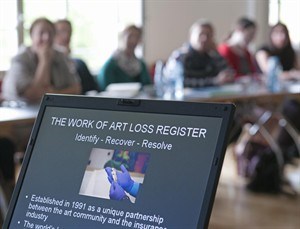
People attend the Provenance Research Training Program to the Nazi-looted art, in Magdeburg, central Germany, Thursday, June 14, 2012. Experts from museums, auction houses, government agencies and other institutions are meeting in Germany this week as part of an international effort to train art-world professionals in issues related to recovering and restituting art and cultural treasures looted during the Nazi era. The six-day conference brings together 35 experts from more than a dozen countries. (AP Photo/Jens Meyer)
June 14, 2012 - 10:02 AM
BERLIN - Call them the looted treasure detectives.
Experts from museums, auction houses, government agencies and other institutions are meeting in Germany this week as part of an international effort to train art-world professionals in recovering art and cultural treasures looted during the Nazi era.
Sixty-seven years after the end of World War II, there are still millions of items that were lost or stolen during the Nazi era that have not been recovered. The items were taken by the Nazis themselves, plundered by the Soviets at the end of the war and even taken home by Allied troops.
The six-day conference that ends Friday in the eastern city of Magdeburg was organized by the European Shoah Legacy Institute and brings together 35 experts from more than a dozen countries.
"The press tends to focus on the high end of the art market, the major paintings and so on, but what was taken was far vaster," said Wesley Fisher, director of research for the Conference on Jewish Claims Against Germany, which helps administer the program.
This is the first meeting of the new Provenance Research Training Program, which the Shoah Legacy Institute says will be offering similar workshops in other countries to provide advanced training "in issues concerning cultural plunder during the Third Reich, the Holocaust and World War II."
"This is an attempt to deal worldwide with the fact that there is no training in this," Fisher said. "There are people who have some expertise ... but they have not been formally trained."
Developing a worldwide network of experts is extremely important in tracking looted art because it often moves through numerous countries, he explained.
The centre in Magdeburg was set up by the German government to co-ordinate the documentation of cultural assets and lost cultural assets across Germany's 16 states. Many other countries — especially in eastern Europe — have no mechanisms at all for such work, Fisher said.
"Entire libraries were taken — you're talking about millions of books — and items in people's home," he said. "Just taking the genocide of the Jews alone, if you have 6 million people killed, that's at least 2 million families ... and the sheer number of Torahs, menorahs is very great."
Participants are attending workshops on culture plunder, methodological training, specialized research and restitution policies, as well as discussions on the political, moral and ethical issues of plunder.
Despite the passage of time, Fisher said the job is more relevant than ever.
"Now, over 60 years later, you're beginning to get a situation where people are passing on and the items then end up in the family estate and are being given up for auction, so many of these things have been coming to the art market," he said.
News from © The Associated Press, 2012